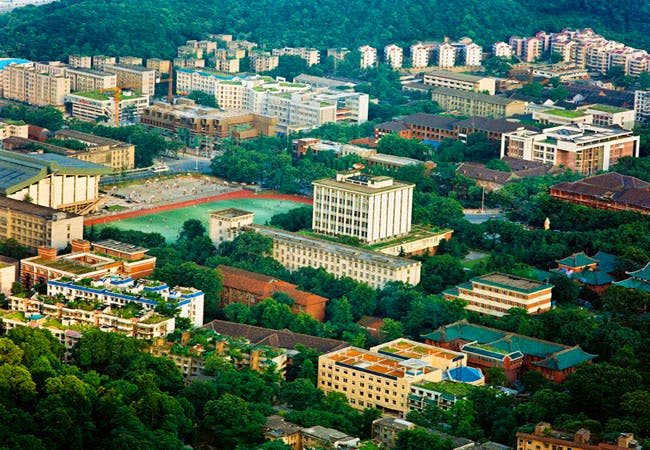History
Hunan University traces its history back to the Yuelu Academy founded in 976 AD during the Song dynasty. Shuyuan was one form of higher learning school in China; another form was government-sponsored schools including imperial central school Taixue or Guozijian and regional schools. The Yuelu Academy was a venue for Chinese scholars and their students to meet and discuss sophisticated topics in the areas of Confucian Studies.
The modern school was founded in 1897, initially called Shiwu Xuetang and in 1903 called the Hunan Institute of Higher Learning. The school name Hunan University was proposed in 1912, and in 1926 Hunan University was composed of three specialized public schools of Hunan. It was renamed Central-South Institute of Civil Engineering in 1937 and then Hunan Polytechnic College. The name Hunan University was again adopted in 1949.
The University
Hunan University is situated at the foot of the picturesque Yuelu Mountain and on the west bank of the rippling Xiangjiang River in the historically and culturally renowned City of Changsha, capital of Hunan Province. It enjoys the title of an "Ancient Millenarian Academy, Famous Centennial University". As one of the key and most comprehensive universities affiliated with the Ministry of Education, it has been included in the state's "Project 211" and "Project 985" for priority investment and construction.
Carrying forward the celebrated traditions of quality education and personnel cultivation, Hunan University continues to focus on the essence of its motto "Seeking Truth from Facts; Daring to be Pioneers" and the style of "Be Profound, Intelligent, Diligent and Dedicated in the Pursuit of Knowledge". It has adopted a distinctive teaching style featuring a "solid foundation, active thinking, strong adaptability, and good comprehensive quality". Since the founding of the People's Republic of China, the university has produced numerous senior professionals. Many of our graduates have become academic experts, entrepreneurs, and high ranking officials in government organs and private sectors, while 36 faculty and alumni members have been elected as academicians of the Chinese Academy of Science and the Chinese Academy of Engineering. The full-time student body totals more than 36,000, of which over 20,000 are undergraduates and 15,000 are graduates. The employment rate of fresh graduates keeps a record of over 95%.
Academics
The University has Graduate School and 25 colleges and departments. Professional disciplines involve 11 subject categories, namely philosophy, economics, law, education, literature, history, science, engineering, management, medicine, and arts, which offer 27 first-order disciplines authorized to confer Ph.D. degrees, 36 first-order disciplines authorized to confer Master's degree, 20 professional master’s degree authorizations, one professional doctorate degree authorization, 2 key first-order disciplines and 14 key second-order disciplines honored at the national level, and 25 post-doctoral research programs. Seven disciplines rank among the top 1% on the ESI rankings, among which engineering science and chemistry rank among top 1‰. HNU has 7 characteristic disciplines of national defense. Chemistry and mechanical engineering are listed as “world-class disciplines” of the Ministry of Education.
HNU has established several national basic-course teaching bases, including National Teaching Base for Basic Engineering Course (chemistry), National Personnel Training Base for Basic Scientific Research and Teaching of Science (chemistry), National Demonstration Teaching Base of the Software College, and National Cultural-oriented Quality Education Base for College Students. It is a national demonstration university for enhancing entrepreneurship and innovation training reform, and a national exemplary university and national practice-oriented university in entrepreneurship and innovation. HNU has 7 national-level teaching teams, 6 bilingual model courses, 6 experimental projects of innovative talent cultivation, 4 national experimental teaching demonstration centers, 5 national comprehensive reform pilot majors for the Program of Culturing Outstanding Engineers, 3 national undergraduate internship bases, and one national VR experimental teaching center. In recent years, HNU has witnessed numerous achievements, such as 2 First Prizes and 7 Second Prizes in the National Teaching Achievement Assessment; 10 video courses listed as national Excellent Open Courses; 21 courses as national excellent courses for resource sharing; and, 13 courses as national online open courses.
HNU academic exchanges with over 160 universities and research institutes across the world, and enrolled overseas students from over 108 countries and regions, as well as Hong Kong, Taiwan, and Macau. It established internship bases worldwide. More than 2,000 HNU students went to partner universities around the world for study tours and joint educational programs. Confucius Institutes have been established in U.S.A, Canada, and South Korea.
Campus
The University occupies a total area of 1,531,960 square meters with its school buildings covering 1,240,560 square meters. The university library boasts a total collection of over 7.29 million books and 127 Chinese and foreign language databases. Advanced IPv6 campus network has been equipped in all teaching buildings, office buildings, and students' apartments. Multi-channel information-based teaching, management, and service are achieved supported by mobile technology.
HNU is equipped with 2 state key laboratories, 2 national engineering technology research centers, 3 national-level international cooperation bases, one state engineering laboratory, one key discipline laboratory of the State Administration of Science, Technology and Industry for National Defense, 5 key laboratories of the Ministry of Education, 4 engineering technology centers of the Ministry of Education, and 3 discipline innovation and talent introduction bases of institutions of higher education under the Ministry of Education. It has participated in establishing three national “2011 Collaborative Innovation Centers”.
Hunan University National Science Park in Changsha National High-Tech Industrial Development Zone has 56 high-level platforms for university-government, university-enterprise, and inter-university cooperation, and established collaborative relations with 32 provincial, municipal and autonomous region governments, as well as thousands of enterprises. The National Supercomputing Center in Changsha under the overall management and operation of HNU is the third one in China, which provides high-performance computing, cloud computing, and big data processing service for hundreds of institutions of higher education, scientific research institutions, government departments, and enterprises.
University Library
Hunan University Library includes 11 worldwide web virtual professional branch libraries such as Branch Library on Economics, Law, Management, Humanities, Science, Communication and Fine Arts, Chemistry and Environmental Engineering, Civil and Structural Engineering, Mechanical and Materials Engineering, Electric and Information Engineering, and Royal Library of Yuelu Academy, with a total number of 29 Reference Rooms for different subjects. There are nearly 360,000 books in Chinese and foreign languages, and 3,273 kinds of newspapers and periodicals in each branch library, with 529 seats in the Reading Rooms, 127 pieces of equipment for end-user searching and the total area of 5,283 square meters. Branch libraries are all connected to resource servers of Hunan University Library through campus networks and possess unique professional features through collecting various subject-oriented documents. Branch Libraries are opening to provide readers with all kinds of services under a unified model. Under the management mode of integrating books administration, collection, lending, and reading, they are responsible for lending books not only to students and teachers of relevant colleges and departments but also to other readers in Hunan University. At the same time, subordinate reference rooms of branch libraries offer deep-level services of college entrance orientation education, training on information searching, reference, and consultation, document supply, and research subjects confirmation.
Show less













